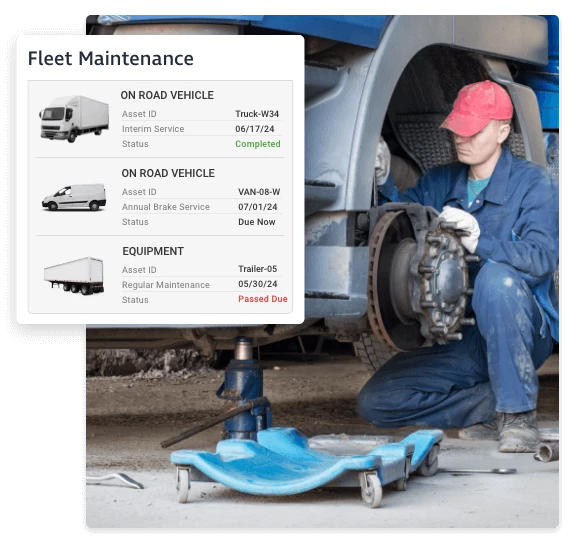Key Takeaways
One of the primary roles of fleet managers is to achieve operational efficiency while keeping costs in check. Fleet maintenance is vital to this equation and can significantly affect the bottom line if not managed properly. Businesses are shifting to digital maintenance solutions, and by harnessing the power of this technology, they can streamline maintenance tasks, enhance vehicle reliability, and reduce overhead costs.
Here are the five most significant ways fleet maintenance software programs can reduce maintenance costs.
Table of Contents
- Automated Scheduling and Alerts
- Real-time Diagnostics and Monitoring
- Centralised Maintenance Records
- Improved Parts Inventory Management
- Enhanced Reporting and Analytics
- Reduce Maintenance Costs for Your Fleet
Automated Scheduling and Alerts
Automated scheduling is a hallmark of digital maintenance programs, ensuring vehicles receive timely preventative maintenance based on specific triggers such as mileage, engine hours, or time intervals. This proactive approach prevents minor issues from escalating into major problems that could sideline vehicles, incur high costs, and disrupt operations. By addressing maintenance needs before they become critical, fleets can maintain operational readiness and reduce unscheduled repairs.
Automated alerts take this further by informing managers about upcoming and overdue maintenance tasks. This preempting allows for better resource planning and allocation. These alerts can also mitigate the risk of missing critical maintenance windows, safeguarding against unexpected vehicle failures. The result is a more reliable fleet that supports uninterrupted operations, ultimately contributing to reduced maintenance costs and enhanced vehicle longevity.

Real-Time Diagnostics and Monitoring
Real-time monitoring offers unmatched insight into vehicle health and performance by flagging potential issues immediately as they arise. This clarity allows managers to promptly address these concerns. The ability to continuously assess vehicle performance and health parameters ensures timely maintenance interventions for effective preventative maintenance.
Real-time diagnostics facilitate a deeper understanding of vehicle health trends overall. This understanding allows for optimised maintenance schedules, ensuring that vehicles are serviced based on actual needs rather than arbitrary schedules. As a result, fleets can achieve significant savings by reducing unnecessary maintenance, extending vehicle life, and improving overall fleet efficiency.
Centralised Maintenance Records
Centralised maintenance recordkeeping within a single digital solution enhances clarity and control over fleet maintenance activities. By consolidating all data points into one place, managers have easier access to historical maintenance data to inform better decision-making regarding vehicle repairs, maintenance schedules, and fleet optimisation strategies. By eliminating the guesswork and manual tracking associated with traditional maintenance management, digital programs streamline operations and reduce administrative overhead.
Additionally, the availability of comprehensive maintenance histories supports strategic decisions about vehicle lifecycle management, including when to repair, refurbish, or retire assets. These strategic insights can lead to substantial cost savings by avoiding premature replacement of vehicles, ensuring limited maintenance resources are spent on vehicles that provide the best returns on investment, and reducing spending on obsolete vehicles. Digital recordkeeping also aids in regulatory compliance and audit readiness, reducing potential costs associated with non-compliance penalties.

Improved Parts Inventory Management
With worldwide supply chain issues in our recent past, the need for practical parts inventory management is clear. This data is essential for minimising maintenance delays and avoiding the high costs of rush orders. Digital maintenance programs offer real-time visibility into parts inventory levels, facilitating proactive ordering and inventory control. This capability ensures that parts are available when needed, reducing vehicle downtime and eliminating the need for expensive, expedited orders.
Digital inventory management allows for more efficient storage space and capital use, reducing excess stock and associated carrying costs. By precisely aligning parts ordering with maintenance forecasting, fleets can take advantage of bulk purchasing discounts and optimise their parts inventory. This strategic approach ensures timely maintenance and reduces costs by streamlining parts procurement and inventory management processes.
Reduce Your Maintenance Costs with Digital Maintenance Programs
See how Digital Maintenance Programs can help you reduce your fleet's maintenance costs.
Enhanced Reporting and Analytics
The analytics and reporting capabilities of digital maintenance programs transform fleet data into actionable insights. These tools allow fleet managers to monitor key performance indicators, identify maintenance trends, and pinpoint areas for cost savings. By leveraging data-driven insights, fleets can refine their maintenance practices, targeting resources more effectively and eliminating wasteful expenditures.
Analytics data also allows for forecasting maintenance needs based on historical data, further optimising maintenance planning and budgeting. This foresight enables fleets to anticipate and budget for maintenance expenditures, improving financial planning and control. Additionally, by identifying and addressing systemic issues that lead to increased maintenance costs, fleets can implement corrective measures that result in long-term savings and enhanced fleet performance.
Reduce Maintenance Costs for Your Fleet
Digital maintenance programs revolutionise fleet management by automating maintenance schedules, delivering real-time diagnostics, and centralising records, all of which significantly reduce costs. These advanced technologies facilitate proactive maintenance, optimise parts management, and provide insightful analytics, ultimately enhancing decision-making and operational efficiency. Fleet managers aiming to implement these cutting-edge strategies can unlock further potential by exploring our comprehensive library of fleet management resources, designed to drive continuous improvement and innovation in fleet operations.
We were bringing in equipment for maintenance on a more frequent basis than needed. Moving from a periodic maintenance schedule to a data driven schedule has already resulted in significant maintenance cost savings.
Eli Demmer, Director of Business Solutions, Watco.

